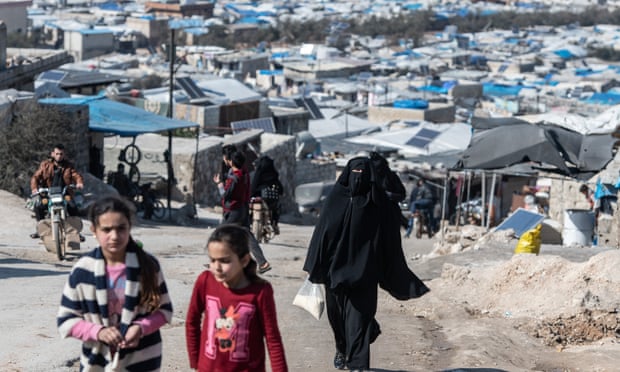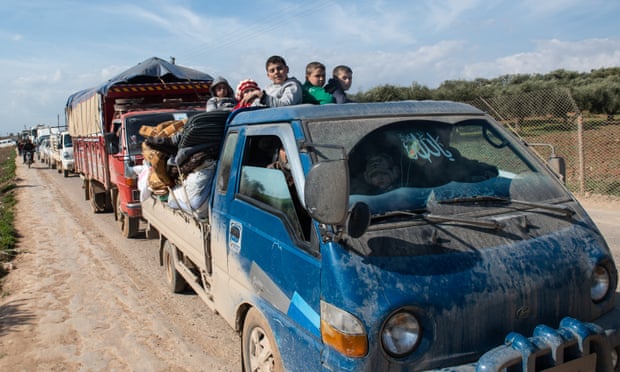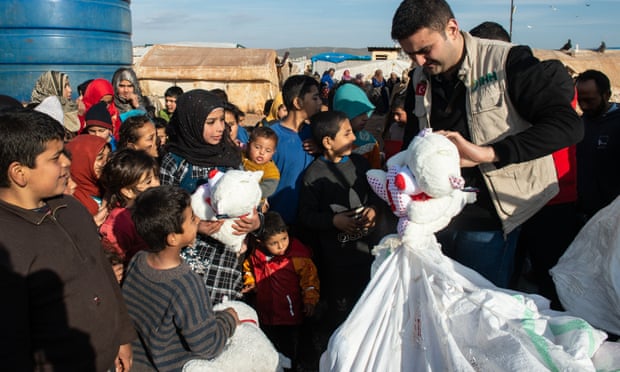With the closed Turkish border behind them and Russian-backed forces at the horizon, Syrians have nowhere left to run
February 22, 2020

Source: The Guardian |Martin Chulov Middle East correspondent
Hemmed against a border wall in Somme-like mud and misery, more than 1 million Syrians are awaiting their fate. Nearby, Iranian-backed militias and what remains of the national army are advancing towards them, as Russian jets pick them off in the crowded fields and ruined towns that are all that is left of opposition-held Syria.
Convoys of the Turkish military, a protector of the displaced that have made it to the province over the last eight years, pass regularly along roads teeming with clapped out cars full of families and remnants of their belongings. Women and children beg them to stop, but they continue on to battlefronts miles from the panic and confusion, their attention diverted from helping the destitute to shaping the final months of the war in Ankara’s interests. Aid workers, who say things have never been worse in Syria, do what they can among scenes they describe as overwhelming and impossible.
Over eight years of slaughter and displacement, the Turks had been the protectors of many people in Idlib – the last part of the war-torn country to remain outside of central government authority – their sole insurance against a final onslaught long considered inevitable and which was launched in mid-January by a conglomerate of forces supporting the Syrian president, Bashar al-Assad, all bent on retaking control.

A Syrian family ride in the back of a truck as up to 1 million civilians have been displaced by fighting in Idlib since December. Photograph: Burak Kara/Getty
Even in a war that has known few boundaries, the last month of brutality has been almost without precedent. Up to 1 million people are again on the move in Idlib. With the Turkish frontier behind them and an ascendant, vengeful foe over the horizon, they have nowhere left to run or hide.
Across the sodden, chaotic plains of the northwestern province, in the newly energised Russian war rooms, and among European diplomats that have failed to steer the war towards a diplomatic end, a realisation is growing that, one way or another, the most devastating conflict of modern times is grinding to a close. Its cost will be enormous, and will likely be paid over many continents and several generations. But first the people of Idlib need help and aid agencies say it has never been harder to deliver.
“It’s not just the mind-boggling number of people in need of critical help, but the fact they are constantly moving,” said the Syria director of Mercy Corps, Kieren Barnes. “It’s next to impossible to preposition the quantity of supplies needed. If the fighting doesn’t stop soon, we have to face the terrible reality that our teams may not be able to reach those most at risk.”
A Mercy Corps worker inside Idlib said: “There is panic, confusion and a sense of loss. Many feel like this is the end of the road. I have never seen anything like this.”
Ahmed Naddour, who is now living in a makeshift tent near the border with six family members after four years of the moves that included Damascus, west Aleppo and the far north of Idlib, said: “Everywhere we could have sheltered has been levelled by the Russians. This is it for us. We have nothing left, and I have not admitted that to myself at any point since 2011.”
Nearby are displaced people from all over Syria: Homs, where the uprising began in 2011; Ghouta, where it was crushed by poison gas in 2013; and Aleppo, whose fall in 2016 marked a change in Ankara’s broad support for the anti-Assad opposition and a turning point in the course of the war.
Through it all, Idlib has been a last redoubt, a place where all comers could seek refuge from pro-regime forces, but at the price of living among extremist groups that had been there before and taken instrumental roles in most aspects of civic life across large parts of the province.
The aegis of extremists, including global jihadists, has been an intractable problem for nationalist opposition groups in Idlib that had received Turkish and, until early 2018, western backing in their fight against Assad. Both sides had accommodated each other in earlier clashes and as the final battle drew nearer.
The presence of extremists had been central to the Syrian narrative that all those opposing it were terrorists from the outset. Large numbers of exiles had been sent to Idlib as part of surrender deals negotiated with vanquished opposition communities and forced to co-exist with extremists. The fear that this would dehumanise an entire population of at least 3.5 million people, 80% of which, according to UN estimates, is made up of women and children, has been borne out in the eyes of international observers.
“Yes, there is fatigue about Syria and war in the region in general,” said a regional diplomat. “But this is one of the gravest crises of our lifetimes. They have created a kill box in Idlib and no-one cares about that.”

Children wait in queue to receive toys. Aid agencies say the continuous movement of people make it difficult to deliver humanitarian aid. Photograph: Burak Kara/Getty
Syrians in Idlib have implored again for international help, but that is unlikely to be forthcoming in the form of any western-backed intervention to stop the Russian-backed push. Even as the US military spokesman for the anti-Isis campaign in Syria and Iraq, Colonel Myles Caggins, called for a stop to the pro-regime offensive on Thursday, he also described Idlib as a “magnet” for extremists who are a “nuisance, menace and a threat”. The words echoed Russia’s stated views and were condemned from inside the province as “an incomplete understanding” of events.
“We are victims of the regime before anyone else,” said Rasha al-Homsi, 26. “Our lives have been reduced to labels that suit others, but don’t reflect what we suffer.”
The UN high commissioner for refugees, Filippo Grandi, made a new appeal on Thursday for those trapped in the province to be able to leave. “For these countries, already hosting 5.6 million refugees, of whom 3.6 million are in Turkey, international support must be sustained and stepped up.”
Ankara seems disinclined to open its borders again – a well-known fact to Russia, which is helping Syrian and Iranian forces on the ground. “This will all end in a deal between them both at some point,” the western diplomat said. “But I’m more worried than ever about the carnage this will leave behind and the chaos it will leave for the region and the world.”
